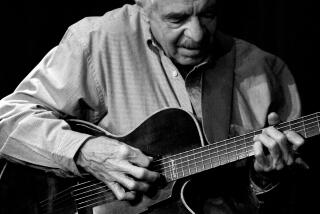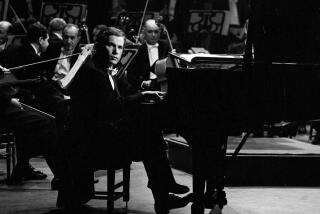Christopher Hogwood dies at 73; conductor gave new life to early music
Christopher Hogwood, an eminent English conductor, musicologist and harpsichordist who took a scholarly approach to early-music and Baroque repertoires, has died. He was 73.
Hogwood died Wednesday at his home in Cambridge, England, after an illness that had lasted several months, according to an announcement on his official website.
An exacting maestro who devoted as much energy to lectures and writing as to performance, Hogwood brought a verbose intellectualism to the world of early music. He wrote extensively on German composer George Frideric Handel and gave long lectures as well as master classes in Europe.
Hogwood founded the Academy of Ancient Music, one of England’s premier Baroque ensembles, in 1973, with help from the Decca recording label, and created approximately 200 albums with its musicians.
The Academy of Ancient Music embodied what would eventually become Hogwood’s lifelong pursuit — the advocacy and preservation of a certain style of performance, often called “historically informed performance,” that dated to the 17th and 18th centuries.
Musicians in the group typically perform on museum-quality instruments, some of which are centuries old, and often stand while playing in the Baroque style.
Hogwood stepped down as the ensemble’s music director in 2006 and assumed the title of emeritus director.
As a conductor, Hogwood received the most international exposure for his renditions of popular Baroque pieces, particularly Handel’s “Messiah.” His 1985 recording of Vivaldi’s “The Four Seasons” was a commercial success whose sales rivaled those of pop releases.
Hogwood guest-conducted ensembles around the world and made a handful of stops in Southern California over the years.
“Original instruments were not feeble,” Hogwood told The Times in 1993 while in Costa Mesa for a performance with the St. Paul Chamber Orchestra. “There is this illusion that they somehow were little waifs and strays. They were lusty instruments.”
Hogwood was part of the music world’s Baroque elite, an informal group of jet-set conductors that includes Nikolaus Harnoncourt, William Christie and John Eliot Gardiner.
Their advocacy of early music helped to propel the once marginal genre back into the classical mainstream.
In performances, Hogwood often preferred brisk and galloping tempos, as well as rather strict interpretations of timeless pieces.
Some critics found his style to be overly mechanical and devoid of emotion.
A Times review of a 1995 Hollywood Bowl concert with the L.A. Chamber Orchestra faulted the conductor’s take on music by Bach and Vivaldi: “Under his direction, all the instruments seemed to aspire to be harpsichords — even and steady in dynamic, detached in phrasing and achieving variety only through changes in articulation.”
Hogwood sometimes made forays into 19th and early 20th century music, and led performances of music by Schubert, Stravinsky and Britten.
Born in Nottingham, England, on Sept. 10, 1941, Hogwood didn’t immediately embrace music as a child, recounting in a 1984 interview that he received piano lessons from “a very stern old lady, not very encouraging.”
He enrolled at Cambridge University, where he switched to studying music from Greek and Latin, and went on to pursue keyboard studies with such notable talents as Rafael Puyana, Mary Potts and Gustav Leonhardt.
Early in his career, he performed the harpsichord with the Academy of Saint Martin-in-the-Fields and was a founder, with David Munrow, of the Early Music Consort of London.
Even when he was leading the Academy of Ancient Music, he found time to appear with other ensembles, landing jobs as principal guest conductor with groups in Europe and the U.S., including a long association with the St. Paul Chamber Orchestra.
Hogwood was on the music faculty at Cambridge for many years and recently served as a professor of music at Gresham College in London.
During the ‘70s and ‘80s, he was a regular radio presence in Britain, working as a writer and presenter of the BBC radio show “The Young Idea,” which was devoted to music. He was named a Fellow of the Royal Society of Arts in 1982 and a Commander of the British Empire in 1989.
Later in his career, Hogwood continued to campaign for early music, traveling in 2010 to China, where he led master classes in Baroque performance.
“I don’t think that the business of the conductor is to stand between the audience and the composition. I think in that sense you should be transparent, in the most positive way. Not invisible, but transparent,” he told Canada’s Globe and Mail in 1995.
Hogwood, who was single, is survived by his sisters, Frances, Kate and Charlotte, and his brother, Jeremy.
david.ng@latimes.com
Twitter: @DavidNgLAT
More to Read
Start your day right
Sign up for Essential California for the L.A. Times biggest news, features and recommendations in your inbox six days a week.
You may occasionally receive promotional content from the Los Angeles Times.







